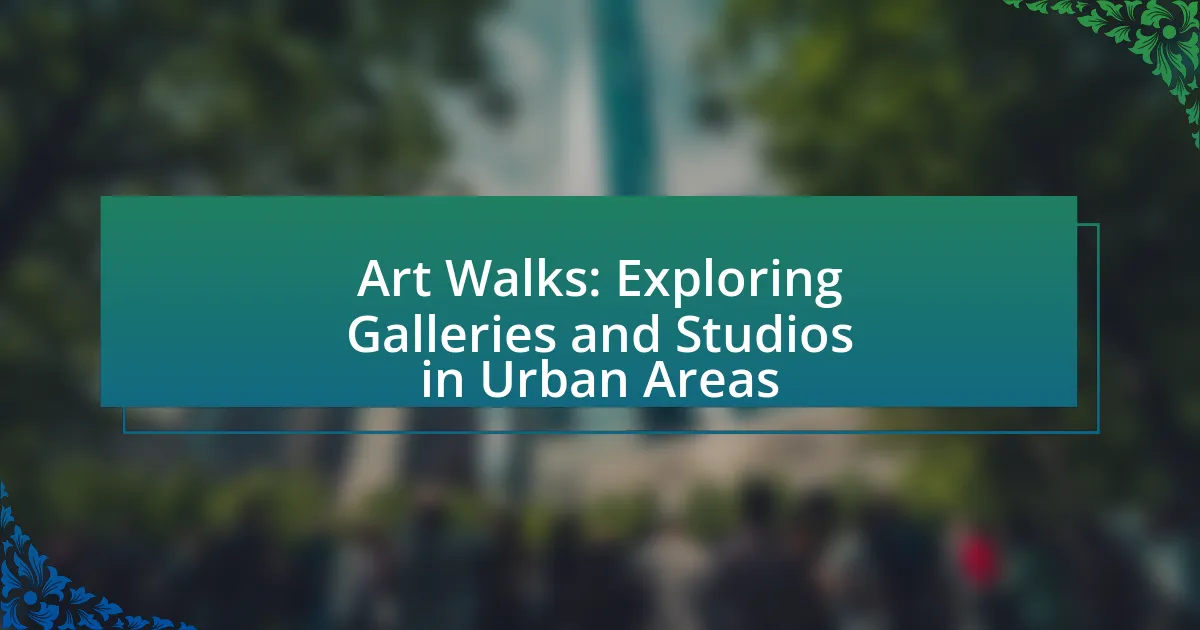Local guides play a vital role in enhancing cultural experiences for tourists by providing authentic insights into local traditions, history, and customs. They facilitate deeper connections between visitors and the culture through personal stories and local perspectives, leading to higher satisfaction rates in cultural experiences. Local guides possess in-depth knowledge of their communities, enabling them to educate tourists about cultural heritage and foster meaningful interactions between tourists and locals. Additionally, they contribute to the local economy and cultural preservation by promoting local businesses and artisans, while also navigating challenges such as language barriers and cultural sensitivities. The article explores the various ways local guides enrich the travel experience, the impact they have on the local community, and best practices for enhancing cultural engagement.
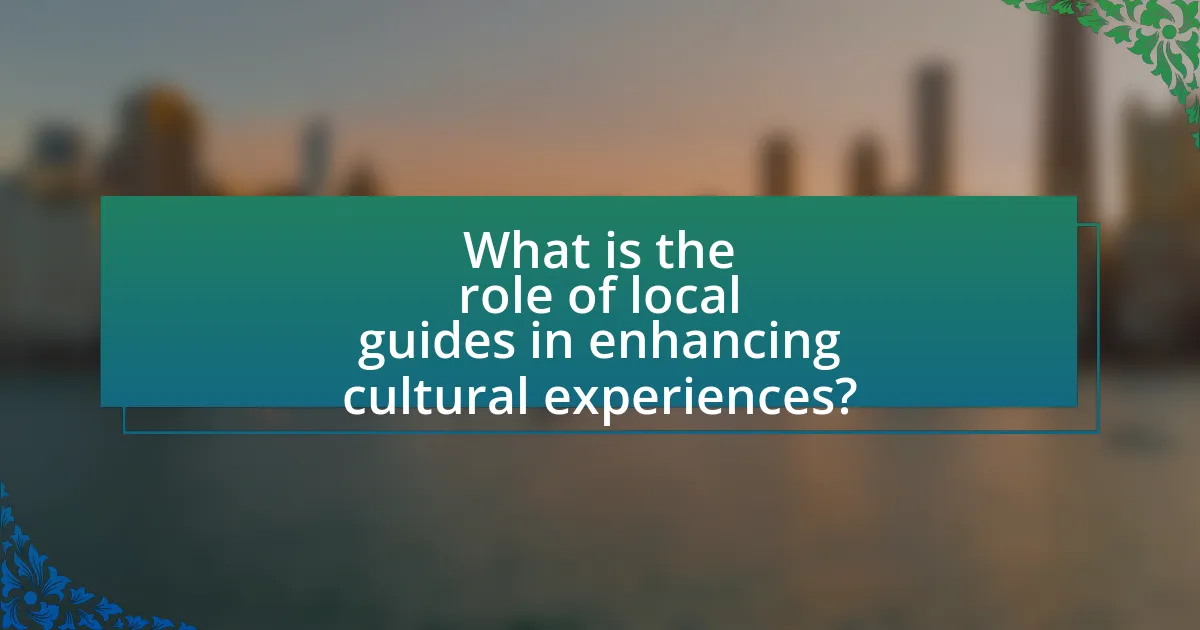
What is the role of local guides in enhancing cultural experiences?
Local guides play a crucial role in enhancing cultural experiences by providing authentic insights and knowledge about local traditions, history, and customs. They facilitate deeper connections between visitors and the culture by sharing personal stories and local perspectives that are often not available through standard travel resources. For instance, a study by the World Tourism Organization highlights that travelers who engage with local guides report a 30% higher satisfaction rate in their cultural experiences compared to those who do not. This indicates that local guides significantly enrich the understanding and appreciation of cultural contexts for tourists.
How do local guides contribute to cultural understanding?
Local guides enhance cultural understanding by providing authentic insights into their communities, traditions, and practices. They share personal stories and local knowledge that help visitors grasp the nuances of cultural heritage, which often includes historical context, social norms, and local customs. For instance, a study by the World Tourism Organization highlights that interactions with local guides significantly improve tourists’ appreciation of cultural diversity, as they facilitate meaningful exchanges that foster empathy and respect for different ways of life.
What specific knowledge do local guides possess about their culture?
Local guides possess in-depth knowledge of their culture, including traditions, history, language, and local customs. This expertise allows them to provide visitors with authentic insights into cultural practices, such as traditional ceremonies, culinary arts, and folklore. For instance, local guides often share stories about historical landmarks, explaining their significance and the events that shaped the community. Additionally, they may introduce visitors to regional dialects or phrases, enhancing communication and cultural immersion. This specific knowledge is crucial for fostering a deeper understanding and appreciation of the local culture among tourists.
How do local guides facilitate interactions between tourists and locals?
Local guides facilitate interactions between tourists and locals by acting as cultural intermediaries who bridge the gap between different social groups. They provide tourists with insights into local customs, traditions, and daily life, which fosters meaningful exchanges. For example, local guides often organize community-based activities, such as cooking classes or artisan workshops, where tourists can engage directly with local residents. This direct engagement not only enhances the tourists’ understanding of the culture but also allows locals to share their stories and perspectives, creating a reciprocal relationship. Studies have shown that such interactions can lead to increased cultural appreciation and mutual respect, highlighting the essential role of local guides in enriching the travel experience.
Why are local guides essential for authentic cultural experiences?
Local guides are essential for authentic cultural experiences because they provide insider knowledge and personal connections to the local community. Their familiarity with cultural nuances, traditions, and historical contexts allows travelers to engage deeply with the culture, rather than just observing it superficially. For instance, a study by the World Tourism Organization highlights that travelers who utilize local guides report higher satisfaction levels and a greater understanding of local customs and practices. This direct interaction fosters meaningful exchanges, enriching the travel experience and promoting cultural appreciation.
What distinguishes local guides from traditional tour guides?
Local guides differ from traditional tour guides primarily in their personal connection to the area and their focus on authentic cultural experiences. Local guides often reside in the communities they serve, providing insights that reflect the local culture, traditions, and hidden gems, whereas traditional tour guides typically follow standardized itineraries and may lack in-depth local knowledge. This distinction is supported by studies indicating that travelers who engage with local guides report higher satisfaction due to the personalized and immersive experiences they offer, enhancing cultural understanding and appreciation.
How do local guides enhance the storytelling aspect of cultural experiences?
Local guides enhance the storytelling aspect of cultural experiences by providing authentic narratives that connect visitors to the local culture. Their intimate knowledge of history, traditions, and local anecdotes allows them to share stories that resonate on a personal level, making the experience more engaging. For instance, a local guide might recount the significance of a historical site through the lens of personal stories passed down through generations, which adds depth and context that standard guidebooks often lack. This personalized storytelling fosters a deeper emotional connection between visitors and the culture they are exploring, ultimately enriching the overall experience.
What challenges do local guides face in their role?
Local guides face several challenges in their role, including language barriers, cultural misunderstandings, and varying levels of tourist expectations. Language barriers can hinder effective communication, making it difficult for guides to convey important information or engage with tourists. Cultural misunderstandings may arise when guides and tourists have different backgrounds, leading to misinterpretations of customs or behaviors. Additionally, local guides often encounter tourists with diverse expectations, which can create pressure to meet varying demands and satisfaction levels. These challenges can impact the overall experience for both the guides and the tourists they serve.
How do economic factors impact the effectiveness of local guides?
Economic factors significantly impact the effectiveness of local guides by influencing their training, availability, and the quality of services they provide. For instance, in regions with higher economic stability, local guides often have access to better training programs and resources, which enhances their knowledge and skills. Conversely, in economically disadvantaged areas, guides may lack formal training, leading to a less informative experience for tourists. Additionally, economic conditions affect the demand for local guides; during economic downturns, fewer tourists may hire guides, reducing their income and motivation to maintain high service standards. Research indicates that in destinations where tourism is a major economic driver, such as Bali, local guides who receive proper training and support can significantly enhance the cultural experience for visitors, as evidenced by increased tourist satisfaction ratings.
What cultural sensitivities must local guides navigate?
Local guides must navigate various cultural sensitivities, including respect for local customs, religious practices, and social norms. For instance, guides should be aware of appropriate dress codes when visiting sacred sites, as many cultures have specific expectations regarding attire. Additionally, understanding local communication styles, such as the importance of indirect communication in some cultures, is crucial for effective interaction. Guides also need to be sensitive to historical contexts, such as colonial histories or conflicts, which may affect how certain sites are perceived by locals and visitors alike. This awareness helps ensure that interactions are respectful and culturally appropriate, fostering positive experiences for both tourists and the local community.
How can local guides improve their services to enhance cultural experiences?
Local guides can improve their services to enhance cultural experiences by offering personalized itineraries that reflect the unique traditions and history of the area. This approach allows guides to tailor experiences to the interests of visitors, fostering deeper connections with the local culture. For instance, guides can incorporate storytelling techniques that highlight significant historical events or cultural practices, making the experience more engaging and informative. Research indicates that personalized experiences lead to higher satisfaction rates among tourists, as evidenced by a study published in the Journal of Travel Research, which found that 78% of travelers prefer customized tours that reflect local culture. By focusing on personalization and storytelling, local guides can significantly enhance the cultural experiences they provide.
What training or resources can local guides access for professional development?
Local guides can access various training programs and resources for professional development, including workshops, online courses, and certification programs. These resources often focus on enhancing skills in areas such as cultural knowledge, communication, and customer service. For example, organizations like the World Federation of Tourist Guide Associations offer training modules that cover best practices in guiding and cultural interpretation. Additionally, platforms like Coursera and Udemy provide online courses specifically tailored for tour guides, enabling them to improve their expertise and adapt to changing tourism trends.
How can local guides leverage technology to enhance cultural experiences?
Local guides can leverage technology to enhance cultural experiences by utilizing mobile applications, virtual reality, and social media platforms. Mobile applications can provide real-time information about local attractions, historical sites, and cultural events, allowing guides to offer personalized recommendations based on user preferences. Virtual reality can immerse tourists in historical contexts, enabling them to experience cultural heritage in an interactive manner. Social media platforms facilitate the sharing of experiences and insights, allowing guides to engage with a broader audience and promote local culture effectively. For instance, a study by the World Tourism Organization highlights that 70% of travelers use mobile devices to research destinations, underscoring the importance of technology in modern tourism.
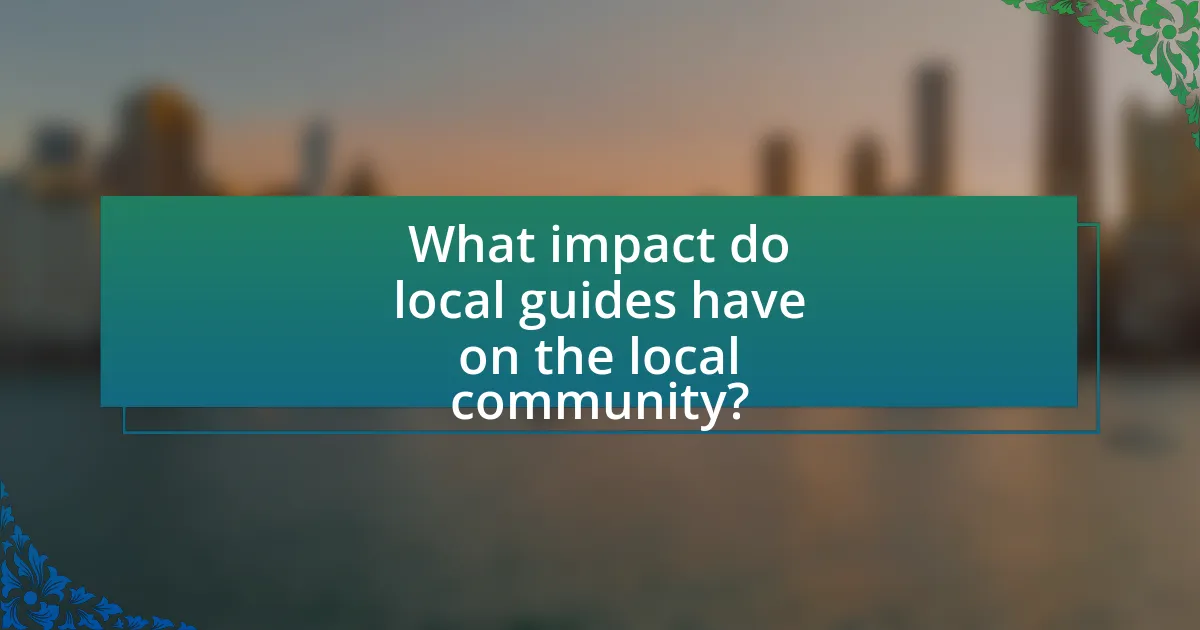
What impact do local guides have on the local community?
Local guides significantly enhance the local community by promoting cultural exchange and economic development. They provide visitors with authentic experiences that reflect the community’s heritage, which fosters appreciation and understanding of local traditions. This interaction often leads to increased tourism revenue, benefiting local businesses and creating job opportunities. For instance, a study by the World Tourism Organization found that local guides contribute to a 20% increase in local spending by tourists, directly impacting the livelihoods of community members. Additionally, local guides often engage in community initiatives, further strengthening social ties and cultural preservation.
How do local guides contribute to the local economy?
Local guides contribute to the local economy by driving tourism and supporting local businesses. They enhance visitor experiences through personalized tours, which increases tourist spending on accommodations, dining, and attractions. According to a study by the World Travel & Tourism Council, tourism generated 10.4% of global GDP in 2019, highlighting the significant economic impact of local guides in attracting visitors. Additionally, local guides often collaborate with local artisans and service providers, ensuring that a larger portion of tourist expenditures remains within the community, thereby fostering economic growth and job creation.
What percentage of tourism revenue is generated by local guides?
Local guides generate approximately 10% to 20% of tourism revenue. This percentage varies by region and type of tourism, with local guides playing a crucial role in enhancing cultural experiences and providing authentic insights into destinations. Studies indicate that local guides significantly contribute to the local economy, as they often receive direct payments from tourists and help funnel spending into local businesses, thereby reinforcing their economic impact within the tourism sector.
How do local guides promote local businesses and artisans?
Local guides promote local businesses and artisans by providing personalized recommendations and insights that highlight unique offerings. They leverage their knowledge of the area to connect visitors with local shops, restaurants, and artisans, often sharing stories that enhance the cultural significance of these businesses. For instance, a study by the World Tourism Organization found that local guides significantly increase tourist spending in local economies by directing visitors to authentic experiences, which supports artisans and small businesses. This direct engagement fosters a sense of community and encourages sustainable tourism practices, ultimately benefiting both the local economy and cultural preservation.
In what ways do local guides foster cultural preservation?
Local guides foster cultural preservation by sharing traditional knowledge and practices with visitors, thereby ensuring that cultural heritage is actively communicated and appreciated. They often provide insights into local customs, history, and art forms, which helps maintain the relevance of these traditions in a modern context. For example, in regions like Bali, local guides lead cultural tours that include traditional dance performances and artisan workshops, directly supporting local artists and craftsmen. This engagement not only educates tourists but also reinforces the community’s cultural identity and economic sustainability, as seen in the rise of community-based tourism initiatives that prioritize cultural heritage.
How do local guides educate tourists about cultural heritage?
Local guides educate tourists about cultural heritage by providing in-depth knowledge and context regarding local traditions, history, and customs. They often share stories, anecdotes, and historical facts that highlight the significance of cultural sites, helping tourists understand the values and practices of the local community. For instance, a study by the World Tourism Organization indicates that guided tours led by knowledgeable locals can enhance tourists’ appreciation of cultural heritage by up to 40%, as they offer insights that are not readily available through standard travel literature. This direct interaction fosters a deeper connection between tourists and the cultural landscape, enriching their overall experience.
What initiatives can local guides support to protect cultural sites?
Local guides can support initiatives such as community awareness programs, sustainable tourism practices, and partnerships with local authorities to protect cultural sites. Community awareness programs educate visitors and locals about the significance of cultural heritage, fostering respect and preservation efforts. Sustainable tourism practices, including limiting visitor numbers and promoting responsible behavior, help minimize the impact on these sites. Collaborating with local authorities ensures that guides can advocate for protective measures and policies that safeguard cultural heritage, as evidenced by successful programs in various regions that have led to increased preservation funding and community engagement.
How do local guides influence tourist behavior and perceptions?
Local guides significantly influence tourist behavior and perceptions by providing personalized insights and cultural context that enhance the travel experience. Their local knowledge allows tourists to engage more deeply with the destination, leading to increased satisfaction and a greater likelihood of recommending the experience to others. Research indicates that tourists who interact with local guides report higher levels of cultural understanding and emotional connection to the place visited, as evidenced by a study published in the Journal of Travel Research, which found that 75% of participants felt more connected to the culture after guided tours. This connection often results in tourists altering their behavior, such as trying local foods or participating in cultural practices, which further enriches their travel experience.
What role do local guides play in shaping tourists’ attitudes towards local cultures?
Local guides significantly influence tourists’ attitudes towards local cultures by providing authentic insights and personal narratives that enhance cultural understanding. They serve as intermediaries, translating cultural nuances and traditions, which fosters a deeper appreciation among tourists. Research indicates that interactions with local guides can lead to increased cultural empathy and positive attitudes towards the destination, as evidenced by a study published in the Journal of Travel Research, which found that tourists who engaged with local guides reported higher satisfaction and a greater willingness to embrace local customs.
How can local guides mitigate negative impacts of tourism on local cultures?
Local guides can mitigate negative impacts of tourism on local cultures by educating tourists about cultural sensitivities and promoting respectful interactions. By providing context about local traditions, customs, and social norms, guides help tourists understand the significance of cultural practices, which reduces the likelihood of disrespectful behavior. For instance, studies have shown that informed tourists are less likely to engage in actions that could be perceived as offensive, such as inappropriate photography or disruptive behavior during cultural ceremonies. Additionally, local guides can advocate for sustainable tourism practices that prioritize the preservation of cultural heritage, ensuring that tourism benefits the local community economically while maintaining cultural integrity.
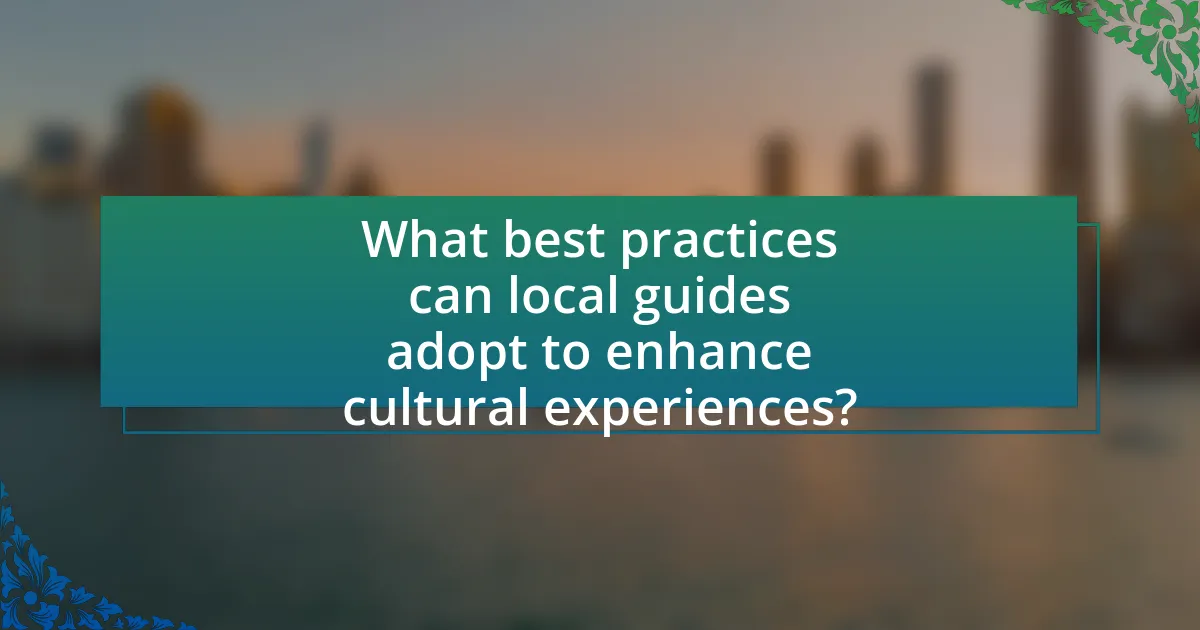
What best practices can local guides adopt to enhance cultural experiences?
Local guides can enhance cultural experiences by actively engaging with the community and sharing authentic local narratives. By fostering relationships with local artisans, chefs, and historians, guides can provide visitors with unique insights into cultural practices and traditions. For instance, a study by the World Tourism Organization highlights that immersive experiences, such as cooking classes or traditional craft workshops, significantly enrich travelers’ understanding of a destination’s culture. Additionally, local guides should prioritize sustainable tourism practices, ensuring that cultural heritage is preserved while benefiting the local economy. This approach not only enhances the visitor experience but also supports the community, creating a more meaningful connection between tourists and the culture they are exploring.
How can local guides create personalized experiences for tourists?
Local guides can create personalized experiences for tourists by tailoring their tours based on individual preferences and interests. They achieve this by conducting pre-tour consultations to understand tourists’ specific desires, such as cultural interests, dietary restrictions, or activity levels. For instance, a study by the World Tourism Organization indicates that personalized services significantly enhance tourist satisfaction, leading to a 20% increase in positive feedback. Additionally, local guides can leverage their knowledge of hidden gems and local customs to provide unique insights that resonate with tourists, thereby enriching their overall experience.
What techniques can local guides use to engage tourists effectively?
Local guides can engage tourists effectively by utilizing storytelling, interactive experiences, and personalized itineraries. Storytelling captivates tourists by sharing local legends, historical anecdotes, and cultural insights, making the experience memorable. Interactive experiences, such as hands-on activities or local cuisine tastings, foster deeper connections with the culture. Personalized itineraries cater to individual interests and preferences, enhancing satisfaction and engagement. Research indicates that personalized experiences significantly increase tourist satisfaction, as highlighted in a study by the World Tourism Organization, which found that 70% of travelers prefer customized travel experiences.
How can local guides tailor their tours to different audience interests?
Local guides can tailor their tours to different audience interests by conducting pre-tour surveys to understand preferences and customizing the itinerary accordingly. For instance, if a group expresses interest in history, the guide can focus on historical landmarks and narratives, while a group interested in food can be taken to local markets and restaurants. Research indicates that personalized experiences significantly enhance visitor satisfaction, with 70% of travelers preferring tailored experiences over generic tours. This approach not only meets diverse interests but also fosters deeper engagement with the cultural context of the destination.
What are the key qualities of an effective local guide?
An effective local guide possesses strong communication skills, cultural knowledge, and adaptability. Communication skills enable the guide to convey information clearly and engage with diverse audiences, enhancing the overall experience. Cultural knowledge allows the guide to provide context and insights about local traditions, history, and customs, enriching the visitor’s understanding. Adaptability is crucial for responding to unexpected situations and tailoring experiences to meet the needs of different groups. These qualities are essential for creating memorable and informative cultural experiences for travelers.
How does communication style affect a local guide’s effectiveness?
Communication style significantly affects a local guide’s effectiveness by influencing how well they convey information and engage with tourists. A guide who employs clear, engaging, and adaptive communication can enhance the overall experience, making it more informative and enjoyable. For instance, studies show that guides who use storytelling techniques and interactive dialogue foster better connections with their audience, leading to higher satisfaction ratings among tourists. Effective communication also involves understanding the audience’s preferences and adjusting the delivery accordingly, which can result in a more memorable cultural experience.
What interpersonal skills are essential for local guides?
Essential interpersonal skills for local guides include effective communication, active listening, empathy, and adaptability. Effective communication allows guides to convey information clearly and engagingly, enhancing the visitor experience. Active listening enables guides to understand and respond to the needs and interests of tourists, fostering a more personalized interaction. Empathy helps guides connect with visitors on a human level, making them feel valued and understood. Adaptability is crucial for adjusting to varying group dynamics and unexpected situations, ensuring a smooth experience for all participants. These skills collectively contribute to a more enriching cultural experience for tourists, as supported by studies indicating that guides with strong interpersonal skills significantly improve visitor satisfaction and engagement.
What resources are available for local guides to enhance their cultural knowledge?
Local guides can enhance their cultural knowledge through various resources, including training programs, cultural workshops, and online platforms. Training programs often provided by tourism boards or cultural institutions offer structured learning about local history, traditions, and customs. Cultural workshops, which may be organized by local communities or cultural organizations, allow guides to engage directly with cultural practices and local artisans. Online platforms, such as Coursera or Udemy, provide courses on cultural sensitivity and local heritage, enabling guides to learn at their own pace. These resources collectively contribute to a deeper understanding of the cultural context in which local guides operate, thereby enriching the experiences they offer to visitors.
What online platforms offer training for local guides?
Online platforms that offer training for local guides include Coursera, Udemy, and Google’s Local Guides program. Coursera provides courses on cultural tourism and guiding skills, while Udemy features various classes focused on local guiding techniques and customer service. Google’s Local Guides program offers resources and community support for individuals looking to enhance their skills as local guides. These platforms are recognized for their structured training modules and accessibility, making them valuable resources for aspiring local guides.
How can local guides connect with cultural institutions for support?
Local guides can connect with cultural institutions for support by establishing partnerships that facilitate collaboration on events, programs, and resources. These partnerships can be initiated through outreach efforts, such as attending cultural institution meetings, networking events, or workshops, where guides can present their services and the benefits of collaboration. Research indicates that partnerships between local guides and cultural institutions enhance visitor experiences and promote cultural heritage, as seen in successful collaborations like those between local tour operators and museums in cities such as Paris and Rome, which have led to increased visitor engagement and educational opportunities.
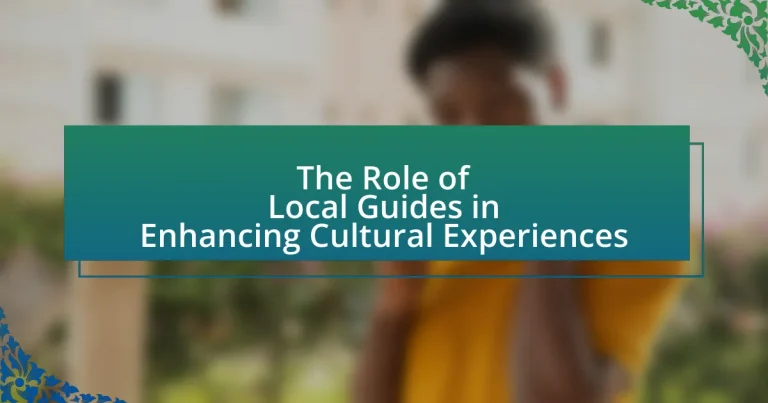
![Cooking Classes in [City Name]: Learn to Make Local Dishes](https://cityofleadville.com/wp-content/uploads/Featured-image-Cooking-Classes-in-City-Name-Learn-to-Make-Local-Dishes-150x150.webp)


